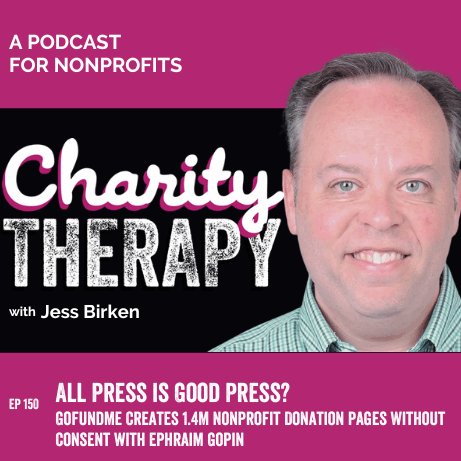Charity Therapy Podcast
149: Um, Actually… | How Many Times Should a Nonprofit Board of Directors Meet?
If your board hasn’t met in ten months, that’s not just awkward – it’s a big problem.
In this episode, Meghan and I dive into a basic (but often overlooked) part of nonprofit governance: how often a board needs to meet, and what happens when it doesn’t.
Real Listener Question: “My wife joined the board of a small arts nonprofit, but they haven’t met once in ten months. The executive director sends quarterly updates by email – that’s it. Is that legal?”
A board that never meets isn’t really a board – it’s a liability. Meghan and I talk about what state laws and bylaws actually require, what fiduciary duties board members are neglecting when they don’t meet, and how to raise the issue without making enemies. We also unpack what counts as a real “meeting,” why email updates don’t cut it, and what to do if you’re stuck on a board that’s asleep at the wheel.
What You’ll Learn:
- The bare minimum number of meetings a board should have each year
- Why your bylaws matter more than you think
- What fiduciary duties mean – and how ignoring them puts you at risk
- Why a one-way email is not a valid board meeting
- How to raise governance concerns without burning bridges
- When (and how) to walk away from a dysfunctional board
Bottom line: If your board isn’t meeting, it’s not leading. You can’t fulfill your fiduciary duties by inbox – and sometimes, the bravest move is to speak up or step out.
Resources from this Episode
- Learn about fiduciary duties here: https://birkenlaw.com/cornerstone-content/what-does-it-mean-to-be-nonprofit-board-member/
- Previous Episode: When Nonprofits Should (Or Shouldn’t!) Use PEOs for Their HR with Jess Holst: https://birkenlaw.com/charity-therapy-podcast/ct148/
- Episode Transcript: https://birkenlaw.com/wp-content/uploads/2025/10/CT149_Trasncript.pdf
Connect with Us
- Jess Birken: https://www.linkedin.com/in/jessbirken/
- Meghan Heitkamp: https://www.linkedin.com/in/meghan-heitkamp-829254115/
Listen & Engage
- Listen on Apple Podcasts | Spotify | YouTube | Amazon Music
- Rate & Review on Apple Podcasts: Click “Ratings and Reviews” then “Write a Review”
- Send us your nonprofit questions: https://birkenlaw.com/podcast/#podcast-story
Stay Connected
- Sign up for the Birken Law Email list: https://birkenlaw.com/signup/
- Follow us on Facebook, Instagram, Twitter
Transcript
Jess Birken 00:00:02 Welcome to Charity therapy, the podcast where we explore the ups and downs of the nonprofit sector and answer your burning questions. I’m your host, Jess Birkin, owner of Birkin Law Office, and I’m excited you’re here. Imagine hanging out with me and my super smart, funny, nonprofit expert pals. You get to ask them anything about your nitty gritty nonprofit life and get their wisdom for free. Whether you’re a seasoned pro or just strapping on your nonprofit boots, we’re here to share stories and remind you you’re not alone on this journey. So get ready to join the conversation and bring me the tough question. I ain’t scared. Ready to rock? Let’s dive in. Hello. Hello and welcome to this episode of Charity therapy. I’m here with Meghan. Hey, Meghan.
Meghan Heitkamp 00:00:49 Hey, Jess. How’s it going?
Jess Birken 00:00:51 You know, I’m tired.
Meghan Heitkamp 00:00:52 Man. Sometimes it’s like moving through jello, but we’re still here, you know? Not gonna lie. Yeah, it’s been a long week. Yep. I’m tired.
Meghan Heitkamp 00:00:59 Yeah. Compassion fatigue is high, But. But we’re here. But we’re getting through it. We’re doing it. Sometimes feeling tired and still showing up is all you can do. And speaking of that, do you know who does that? Volunteers. Board members? Yeah. How’s that for a transition? That was really good that way. Anyways, today we’re going to talk about boards and specifically about like what the role of the board really is. And I talked to a lot of our new clients up front. And I’m always struck by how different a board can look depending on the kind of organization it is. Right. Like a small, all volunteer run cat rescue, their board looks very different than a multi-million dollar organization who’s been around for 50 years. It’s like you wouldn’t even realize they technically have the same title within the nonprofit complex. So despite the fact that they look really different. Jess, can you tell us what the job of the board really is?
Jess Birken 00:02:00 I feel like this is a philosophical question.
Jess Birken 00:02:03 I mean, I guess fundamentally.
Jess Birken 00:02:05 Their job is to make sure that the mission happens and that resources that the nonprofit brings in are, are leveraged against that mission. Ultimately, that’s the job. And, you know, like you said, it looks different if you’re a tiny organization, making sure the mission is happening might look like rolling up your sleeves and doing the work. You know, the giant orchestra, it looks like sitting at a conference table and maybe reviewing some financials or doing a strategic planning meeting every so often, you know, like, yeah, yeah.
Meghan Heitkamp 00:02:38 So it’s like the work can be very different, but the responsibilities are the same or the like, you know, the fact that the buck stops with the board is the same for for all organizations.
Jess Birken 00:02:49 The buck stops with the board. Yes. Yeah. Ultimately they get to make sure that the mission’s happening and and laws are being followed and the resources are being used. Right. Yep.
Meghan Heitkamp 00:03:00 Well, that’s the perfect setup for our question today.
Meghan Heitkamp 00:03:03 So let’s just launch straight into it. So go the listener writes in and says, my wife is on the board of a small arts organization, and she’s starting to feel like something weird is going on. The board hasn’t met since she was elected ten months ago, and there are no board meetings scheduled. The Ed sends a board update email once a quarter, but that’s it. She wants to raise the issue, but she’s not sure what the requirements are. Is there a minimum number of board meetings that are legally required? It feels odd that they could go a full year without a meeting.
Jess Birken 00:03:38 Maybe leave.
Meghan Heitkamp 00:03:39 Yeah.
Jess Birken 00:03:39 That’s my. You’re a volunteer. You can walk.
Meghan Heitkamp 00:03:43 Away.
Jess Birken 00:03:43 Yeah, yeah. I mean, this this doesn’t it doesn’t bode well. Yeah. It’s not a good look. Right off the top, you know. And you know, we don’t have a lot to go off of here. Very obviously not a working board. Yeah. Somebody is doing the work. It’s not this board.
Jess Birken 00:03:59 So it’s a small arts organization, but I’m going to assume there’s some kind of staff executive director. Plus, obviously they said that the Ed is sending reports, so something is happening. But it is concerning that there has not been a board meeting in ten months. And I’d love to know more about like why did you join? What was the circumstance.
Meghan Heitkamp 00:04:22 Like how many board members are there? Like what’s you know, like, yeah.
Jess Birken 00:04:27 I want more info. I want, I want more info. But you know, working with what we’ve got. The question is, you know, do you raise the issue. And I think you do because you said yes and now you’re on the hook. Yeah, right. And so now you’re a board member and you have legally you have fiduciary duties. And that involves making sure that the organization is following its own policies and following the law. Now this person doesn’t say what state they’re in. But in my experience, the minimum number of board meetings that you can get away with in most states is one.
Jess Birken 00:05:03 Yeah. Like usually the state statute is like you must have at least one meeting once a year, right? But if your bylaws say something else, then that’s what you should be following. So first question is, does this director have a copy of the bylaw?
Meghan Heitkamp 00:05:19 Yeah.
Jess Birken 00:05:20 Because, you know, we were just dealing with a client this week, last week where people on the board were running around trying to make bylaws because they thought there weren’t any. But it just turns out nobody ever gave them a copy. Yep. Right. So first I would say, hey, you know, I’m a new director, where do we keep our governance document? So I just want to make sure that I educate myself about the organization. So you should be looking for articles, bylaws. You know, you can go on the IRS website, pull out the last nine 90s. There should be some sort of financial statement. You should have access to all those things. And that shouldn’t be a weird ass as a director.
Jess Birken 00:05:59 And then once you have the bylaws in hand, look and see what it says. Does it say how many times a year you’re supposed to meet? Are you supposed to meet quarterly? And we’re just kind of being a little loosey goosey with the meeting. And the meeting has sort of devolved to the EAD sends an email because that’s not really appropriate. You should at least be meeting once a year to review what has gone on and what the plan is to go on for next year. I would expect the board is at least reviewing and approving an organizational budget once a year, and they should be reviewing and approving the filing of the 990 tax form once a year. And those things aren’t at the same time. So there you go. That’s two meetings right there, because your year end is one thing. And then the IRS stuff is due five months later. So probably be meeting at least twice. Yeah. So yeah, it’s a problem. I would raise the issue and you can find out what the requirements are by doing those things.
Jess Birken 00:07:04 The other issue is how much time do you want to put in.
Meghan Heitkamp 00:07:07 Right. Yeah. So that was going to be something I flagged here is that if she is new to the board, and it sounds like maybe the only new one to the board, just by the way, this the tenor of this question, you don’t want to it’s hard to be the new person who’s like, y’all are breaking the law. You’re doing something wrong. I’m coming in here to tell you that you’ve been doing this for a while, and it’s wrong. So it’s like a hard position to put yourself in, even if you know that you’re right. And it’s just like, do you want to put yourself in that position? Like, is that something you want to take on? Well.
Jess Birken 00:07:41 Okay. How many times have we seen where it says small arts organization and it’s not mission specific, just the small organization piece where we have our charismatic founder who’s running off and doing all the work. And I would not be surprised to find out that the board is made up of like, people who just are friends, family, fans of our charismatic leader.
Jess Birken 00:08:04 And they’re kind of not they’re not like they’re just there because legally, this person needed a board and they were like, hey you, you, can you do this for me? Yep. And they said yes.
Meghan Heitkamp 00:08:16 Yeah. And they don’t know what their responsibilities are to the organization. Or they are like trusting the founder to to do what is right and are not really wanting to do the whole due diligence. Right.
Jess Birken 00:08:29 And if everybody’s just been sort of like, yeah, you know, the director sends us an email about what’s been going on and we’re all good with that. And you come in being like, actually, we need.
Jess Birken 00:08:41 To be doing blah, blah, blah, blah, blah.
Jess Birken 00:08:43 Hey, if you want to go there and you want to do that and you want to help this organization level up, get after it. Yeah. But remember your people skills while you’re doing it, because you got a whole group of complacent folks here who may not be interested, in which case I’m like, you know, we’re just remember, you are a volunteer and you can walk away.
Jess Birken 00:09:05 Yeah. Like, you don’t have to continue. So if it’s making you uncomfortable, You’re not doing the right things. You’re not executing fiduciary duties. You’re not following your bylaws. You’re not following the law. You you can let folks know that you’re going to step out because you’re not comfortable with the amount of liability that the board has right now.
Meghan Heitkamp 00:09:27 Yeah.
Jess Birken 00:09:28 You know. Yep.
Meghan Heitkamp 00:09:29 Totally. Just saying, like you’re within your rights to say something and you’re also totally reasonable to say, I don’t I don’t want to do that.
Jess Birken 00:09:35 Yeah, I think give it give it.
Meghan Heitkamp 00:09:37 The old.
Jess Birken 00:09:37 College try. Yeah. They say yeah. Try and bring people around and see where you can get, you know, because probably these people just don’t know. Yeah. They just don’t. They probably have no idea.
Meghan Heitkamp 00:09:47 No. They’ve just been doing it like this. Things are like it just sort of naturally evolved into this. And no one was intentionally like, we’re not going to tell the board what’s going on.
Meghan Heitkamp 00:09:56 The board doesn’t care. Like more than likely it just like through the time of working, this is what ended up happening. And we’re not intentionally trying not to follow the rules here. Yep. So yep, I have a I have a curveball follow up question that this person is not asking, but I’m asking could a board update email ever be considered a board meeting? Like at what point is like, because I know that we have talked to some clients about doing board actions over email or things like that, but like, what does that look like? And like, what’s the difference between like a board meeting and just like conversation among the board over email or something like that?
Jess Birken 00:10:38 Okay. So this is good. This is like really it depends on what state you’re in, right? However, I don’t think that there’s ever a reality where a one way communique from the executive director saying this is what’s up, counts as a meeting. Yeah, I think any lawyer worth their salt, any assistant AG in any state is going to be like a meeting.
Jess Birken 00:11:06 Looks like you are live in some way. You have a discussion. So like here in Minnesota, where we’re setting the statutes really clear around what it means and what you can do for remote meetings. And you have to you can do it online. You just have to facilitate the meeting in such a way that all of the people at the meeting have the ability to, in real time, discuss. Right. You can’t just have like some people are like watching the meeting, but they have no ability to participate. Meanwhile, these other people get to do all the voting. Like that wouldn’t count. The law in this state requires that everyone has the opportunity at the same time to be discussing something, because a one way communication does not allow for discussion. Yeah. Also a one way communication does not sound like there’s anything being asked of them. Yeah. Which gets to your question about like what’s a written action. Yeah. So yes, you could take depending on your state law. This is all depends on your statute.
Jess Birken 00:12:12 Most states allow some sort of action without a meeting at the board level at least. Not talking about voting members right now. Board level. You can vote on something over email, and or you can circulate a memo and have people sign off on it or whatever. But there are rules around that. And a one way communication is not a written action, it’s just a communication. Like the whole thing about written action is the board is doing something. Yeah, deciding something, reviewing, discussing and approving or denying something. The act in the word action is missing from these communiques. Status updates I think status updates are great. That’s fantastic. Love it. But also, they probably should get together. Yeah. And you know, maybe have a say because how do you defend yourself and say yeah I am making sure I don’t know. You know. But here’s the thing I was just having drinks with him. Low, who’s like another nonprofit attorney. She’s amazing. We got to have her on the podcast, by the way.
Jess Birken 00:13:21 She’s gotta come and be a guest. She said she would. And we were talking about like, yeah, breach of fiduciary duty. Like, what are you gonna do? You get these groups where they’re fighting and saying you’re breaching.
Jess Birken 00:13:31 Your fiduciary duty, and it’s like, yeah.
Jess Birken 00:13:34 What’s your remedy? You know, that’s why I kind of go to, you know, you can always walk away.
Meghan Heitkamp 00:13:39 Yeah, yeah.
Jess Birken 00:13:40 Because what are you gonna do? Spend money on taking the board to court? No.
Meghan Heitkamp 00:13:45 Well, and that’s the ultimate thing here is. Yes, the role of the board is to make sure that the mission is being carried out and all of that kind of stuff, but it’s a little squishy about, like, exactly how or like what that looks like. So there’s a lot of room for argument about how to do things. And like that doesn’t bode well for this kind of conversation. Like, it just makes it easy for it for you to devolve into arguing rather than actually getting anything done.
Jess Birken 00:14:12 Yeah. Well, and this you can’t even argue if you’re just getting an email update, right. So there’s.
Meghan Heitkamp 00:14:18 That. Right. 100%. It’s like it’s peaceful. It’s one of these things where it’s like, how much do you want to think that, you know, half these board members don’t actually read the update. You know, it’s like we all miss an email. The other thing. So it’s like, even if you received this update, there’s no guarantee that anyone’s actually looking at it.
Jess Birken 00:14:34 Yeah. Because even if you want to make the argument, you know what? We we’ve delegated a budget approval to the Ed, and we are totally comfortable with status updates being our board meeting. Well, how are you going to verify validate that you’re even reading the email, right. Part of having the meeting is to be like, yes, I was here. I, I upheld the duty of loyalty, the duty of obedience. I showed up, I did my job. So maybe they’re all replying.
Jess Birken 00:15:07 And then logging those replies with like, sounds good, great work or unlikely. But yeah, it’s it doesn’t sound like it.
Meghan Heitkamp 00:15:15 Yeah, yeah. And those The duty is. I’ll link an article we have about fiduciary duties for any board member. That’s like, what are you even talking about? But yeah, to say that you actually fulfilled your responsibilities, your legal responsibilities to the organization.
Jess Birken 00:15:30 Yeah. So what do we got here? Yeah. Meghan, I got.
Meghan Heitkamp 00:15:32 A couple.
Jess Birken 00:15:33 Of things. What’s the wrap up?
Meghan Heitkamp 00:15:34 Yeah. First, the role of a nonprofit board is really to make sure that you are carrying out your mission and using, you know, donated funds appropriately. And that is a true regardless of what kind of board you are, whether you are a working board or a governing board, whether you meet weekly or twice a year. Secondly, there is no universal. You have to meet this number of times legally in statute everywhere. A lot of states will say at least one time a year for a board meeting is the bare minimum, but best practice is as often as it takes in order to fulfill your fiduciary duties, which is probably more than one time a year.
Meghan Heitkamp 00:16:15 So if a board is not meeting, we’re likely looking at something that were not able to fulfill those fiduciary duties. And last, if you are in a situation on a board that is kind of absent and not meeting or fulfilling those, you have a couple options you can absolutely try to approach and, you know, make your case to the board about why we should be meeting more and your volunteer. And you can also walk away and find another organization to be involved with, because it can be an uphill battle to change the culture in that way.
Jess Birken 00:16:48 Yeah. And I would just add to that, like if you are going to quit, like make it a noisy exit, not that you have to be a jerk about it, but state your reasons. Yeah. You know, so that because you have a duty right now. Yeah. And so at least express the reason why you’re leaving is because we’re not doing things well and nobody seems interested in doing it right. I think that’s that is all you can do.
Jess Birken 00:17:11 Yeah. You know, it’s.
Meghan Heitkamp 00:17:11 A good way to show that you took your responsibility seriously. And maybe it’ll inspire other board members to do the same after you depart.
Jess Birken 00:17:19 Right? Right. Well, folks, if you’ve got a board that isn’t doing Jack.
Meghan Heitkamp 00:17:26 Sleeping at the wheel.
Jess Birken 00:17:29 I’m like, do I want to swear right now, I don’t know. Share this episode with them. You know, if you are the person who’s like, I joined this board and what the hell is happening? This is this is a great episode to share with your colleagues because, you know, I’m laying it out for you right here. So leave us a rating. Share it with a friend. Subscribe on your podcast app. It really does help us out. It helps people find the show. If you have a question or a story to share, please send it in. I want to hear the juicy gossip anonymized.
Jess Birken 00:18:01 About your your nonprofit. Let’s let’s go. Please send it in online at Charity Therapy Show.
Jess Birken 00:18:07 And thanks for listening.
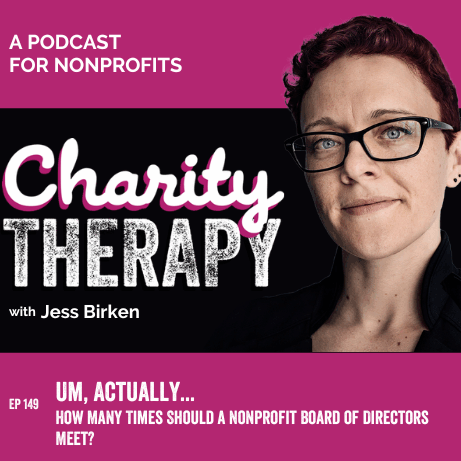
Recent Podcast Episodes
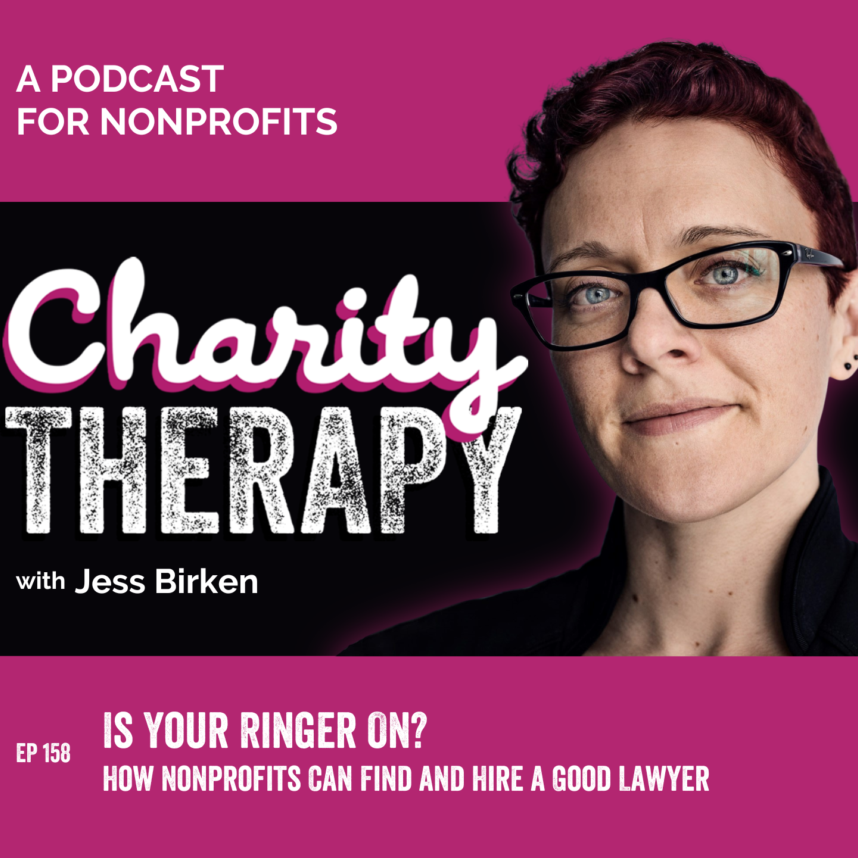
158: Is Your Ringer On? | How Nonprofits Can Find and Hire a Good Lawyer
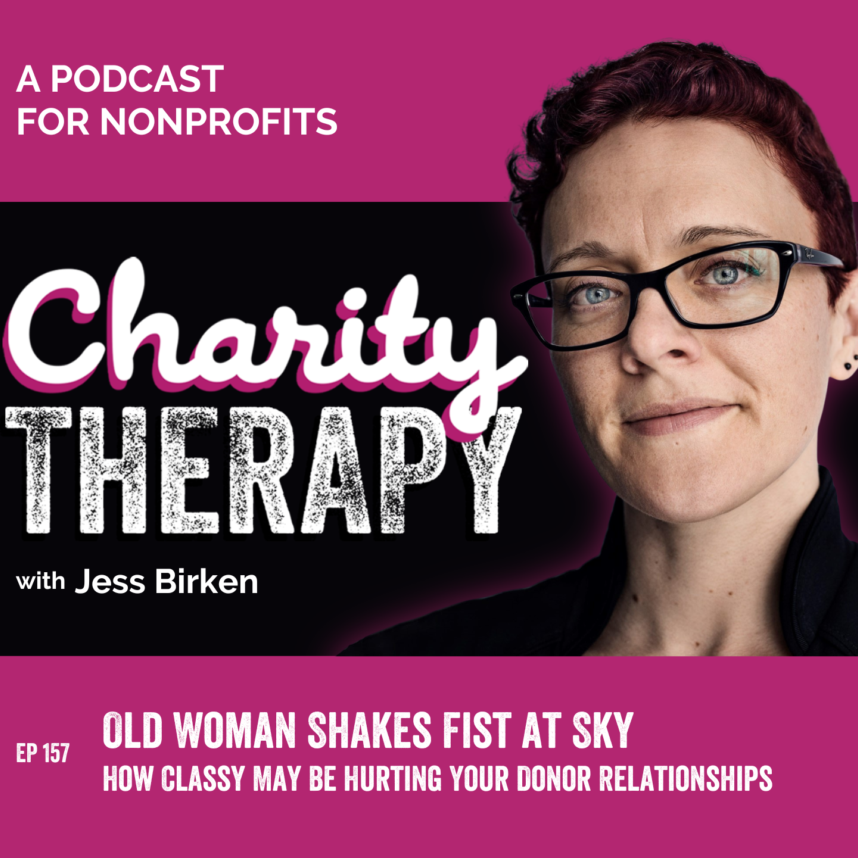
157: Old Woman Shakes Fist at Sky | How Classy May Be Hurting Your Donor Relationships
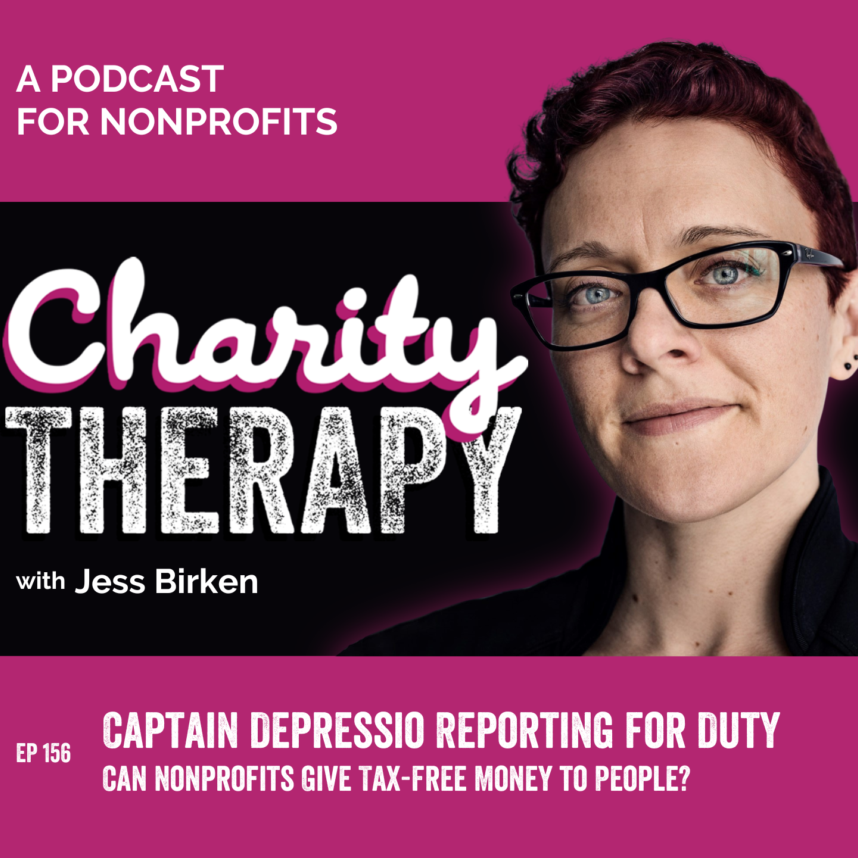
156: Captain Depressio Reporting for Duty | Can Nonprofits Give Tax-Free Money to People?
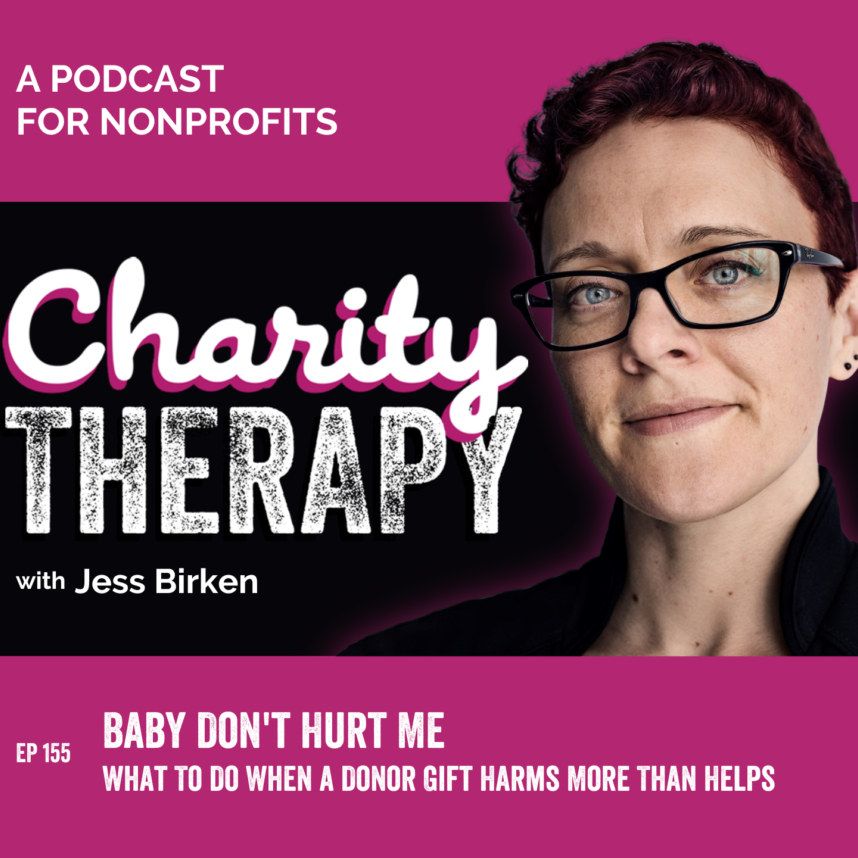
155: Baby Don’t Hurt Me | What To Do When a Donor Gift Harms More Than Helps
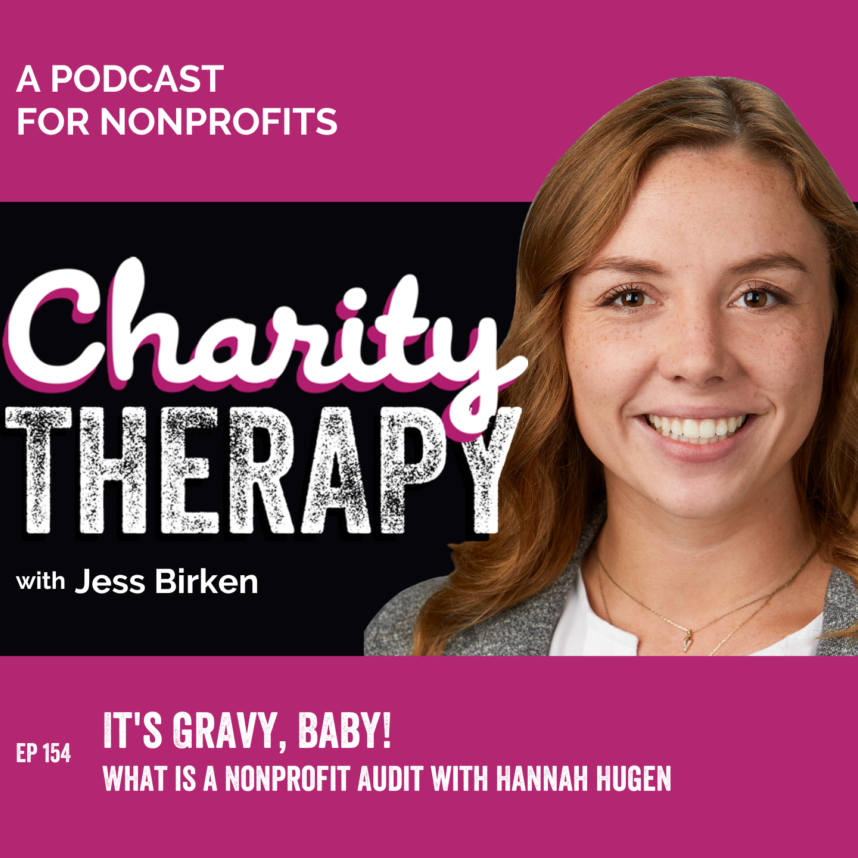
154: It’s Gravy, Baby! | What is a Nonprofit Audit? with Hannah Hugen
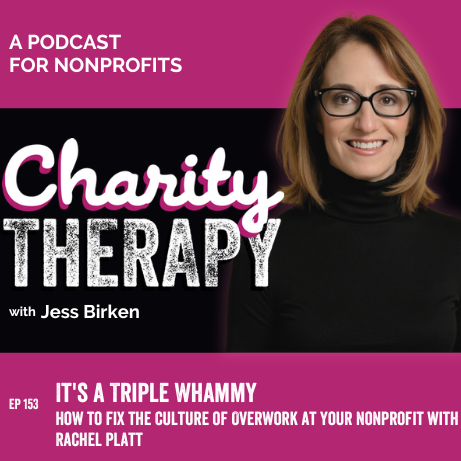
153: It’s a Triple Whammy | How to Fix the Culture of Overwork at Your Nonprofit with Rachel Platt
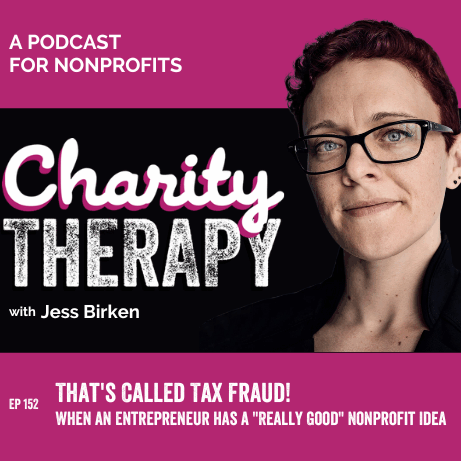
152: That’s Called Tax Fraud! | When an Entrepreneur has a “Really Good” Nonprofit Idea

151: Give Mark Your Crap! | When a PEO is a Good Fit for Your HR Needs with Mark Bromberg
